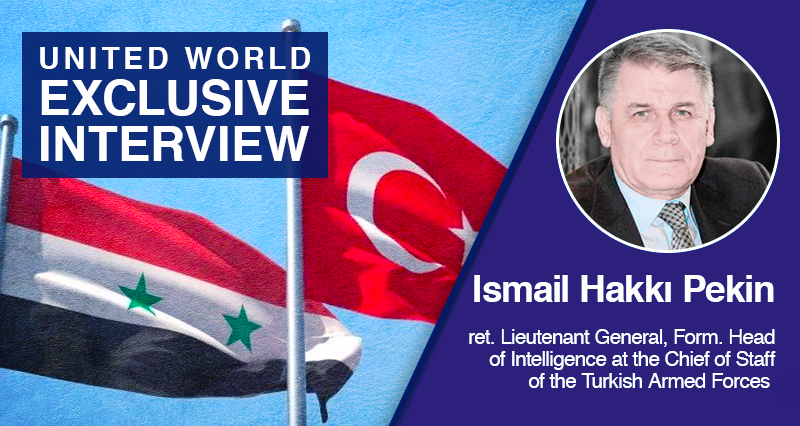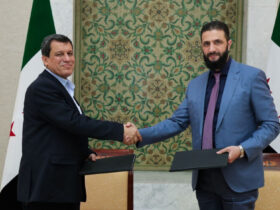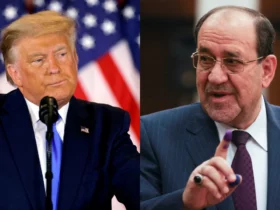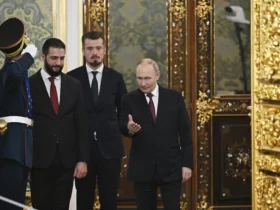After years of interruption of diplomatic relations and even more, armed conflict, the governments of Türkiye and Syria have started direct communication. Defense Ministers and heads of intelligence of both countries met in Moscow under Russian mediation – an act that constituted a major turn in West Asian politics.
We spoke on this change of policy with retired Lieutenant General Ismail Hakkı Pekin. He has played an important role in Turkish-Syrian relations. As Head of Military Intelligence at the General Staff of the Turkish Armed Forces, he was responsible application of the Adana Agreement between both countries after 1998, where PKK terror groups were expelled from Syria to Türkiye. Pekin says he flew frequently to Syria in an effort to coordinate works on the agreement.
After the eruption of the crisis in Syria 2011, Pekin – in retirement – continued to work on the matter. Always demanding the two countries reconciliation and cooperation, he undertook several trips to Syria to meet high ranking government officials, among them President Bashar Al-Assad, the head of National Security Council Ali Mamlouk and Foreign Minister Faisal Mekdad.
What is in your opinion the reason for the start of talks between Türkiye and Syria?
In the recent times, the U.S. has cornered Syrian President Bashar al Assad very much. Their embargo on Syria has caused a great increase of prices. Protests against the government have erupted again, accompanied by reports of corruption.
Ankara was worried about the political weakening of the Syrian President, because there is no alternative to him. Thus, Türkiye, together with Russia, has evaluated that it is necessary to strengthen Assad’s position.
The United States is organizing meetings between Talabani’s Patriotic Union of Kurdistan in Iraq and elements of the PKK in Syria. Washington is trying to organize some connection between the north of Iraq and the north of Syria. This is not in the interest of Türkiye.
The situation in Idleb is also complicated. Here, the U.S. continues its indirect control over M4 highway in Idleb. They have literally bought certain elements of the Syrian armed opposition. They don’t want Iran to fill a potential vacuum here.
The Heyet Tahrir al Sham (HTS) meanwhile establishes an emirate here. From the Turkish perspective, this organization needs to be expelled from that region. These issues have all been on the agenda during the talks.
Ankara “still hesitating” towards Damascus
Do you see a change in Turkish policy towards Syria?
Not fully. Ankara tries to pursue these talks and achieve some results. At the same time, it does not give up on the HTS and the Syrian National Army. Türkiye changes policy gradually, step by step, because a sudden and complete change would cause problems.
The major part of the HTS for instance is being used by the US and United Kingdom. Türkiye condones the support for the organization, despite that it is determined as a terror organization in Türkiye as well. This organization will cause great problems for us in the future.
Here, the model of Daraa can be applied as a solution: They are called to abandon arms and stay, or move away with arms. But generally, there are three regions with clashes in Syria right now: Northeast of Latakia, the northwest of Aleppo and the south of Idleb. And Türkiye has sent in reinforcements.
Are these clashes a topic in the talks?
Yes. The talks deal with what shall be done in future in regards to the armed groups. Their retreat will be planned and connected to a procedure. Here, from a Turkish perspective, it is important not to confront Iran. If stability is achieved within these talks, we can confront the United States better.
Currently, Assad’s forces are not sufficient to achieve stability and control over all these regions. Therefore, a second version of the Adana Agreement is in the talks. According to this idea, political control over the territories will be in the hands of Syria, while Türkiye, Russia and Syria establish jointly military oversight.
Remember that the armed groups only receive support from the territory of Türkiye. If that channel is closed, they will dry out soon.
Talks with Syria “are considered positive by the people I meet”
What is your observation inside Turkish politics and military in regards to the start of these talks?
The people I meet consider the start of talks as positive. Rational people consider that the problem’s solution is not another military operation but political resolution.
The problem is the following: Türkiye takes a hesitating stance. The foreign minister’s meeting was going to be held on February 14, but now, it has become unclear. The Turkish Foreign Minister travelled to the U.S. and created the perception as if he was asking for allowance for that meeting.
But truth is that time is limited and conditions may worsen. For instance, general evaluation is that Iran has arrived at the stage of producing a nuclear bomb, and the U.S. and Israel are undertaking a military exercise right now in the Eastern Mediterranean simulating how to attack Iran.
In that context, I wished the Turkish government had not sent his minister to Washington. The issue of Syria is much more important that the F-16 air fighters, which dominated the agenda on Foreign Minister Çavuşoğlu’s visit.
Sooner or later, we can find a solution to the issue of the F-16s. But if Syria is divided, we will not be able to find a solution for that. We will have to fight different local autonomous regions and emirates at the same time.
US position in regards to the Turkish-Syrian talks
How do you perceive the US position in regards to the Turkish-Syrian talks?
They do not take a definite and clear stance; they use a soft language. Both the United States and Russia do not want to lose the Kurds’ support. The Americans are also working on the Druse, trying to establish a separate canton for these. These cantons shall in their plans end up as a mini-state later.
It is clear that the US does not want Turkish-Russian cooperation to be widened to cover the Syrian problem. That is why they present Türkiye as the enemy on that soil.
The geography presents actually a really chaotic panorama, because at the same time, Saudi Arabia is trying to establish a ‘Sunni Kurdistan’, while also sending money to the HTS.
What should Türkiye do?
Türkiye should talk to President Assad himself and seek ways to strengthen his position. All this chaos cannot be solved by military means.
In the talks, the issue of Syrian refugees should be an item on the agenda, as well as border security with a renewed Adana Agreement.
The sides also have to think about how to end the activities of the Syrian National Armey and the Syrian Provisional Government. The HTS wants to enlarge its emirate towards Al Bab. What response should be given?
The security of the Iraqi-Syrian border needs to be enhanced. And what response will be given to US forcer there? The United States wants to turn Syria into a federation, while Russia only supports cultural autonomy.
All these issues need to be discussed.
Sweden and Finland’s NATO membership
I would like to broaden the angle to cover Sweden and Finland’s NATO membership. Do you see a connection of that issue with Syria?
The trilateral mechanism between Sweden, Finland and Türkiye regarding NATO membership is finished. Still, Sweden provides money, weapons and political support to the Kurdish autonomous zone in Syria. Türkiye should carry that on the agenda and veto the countries’ NATO membership as long as that support continues.
In my opinion, the burning of the Quran in Sweden is a distraction. Sweden’s NATO membership is very important for the US. For us, the issue of the PKK is very important. Talks should focus on that problem.
Besides, the cohesion of NATO might not be as strong as it appears. I am asking myself whether a new structure or grouping emerges within the NATO, headed by Poland and including the United Kingdom, and eastern European and Scandinavian countries. France and Germany would be in the opposing camp.
As a matter of fact, excluding Türkiye from NATO is not very easy in that context. But still, the United States wants to cut Türkiye’s connection with Europe and the Balkans. I wonder whether the burning of the Quran is a step within that plan, a way to light up a new Clash of Civilizations.
Or it may also be that the Swedish deep state has permitted that act on purpose, calculating its consequence for NATO membership, because they were too afraid of a future clash with Russia.
Anyhow, Türkiye at this point needs to continue its veto against Sweden and Finland’s NATO membership, regardless of the Quran provocation. Türkiye’s fight against terror should focus on the following three points: 1. Clean up terror groups inside the country; 2. Clean up those in the close neighborhood; 3. Cut of financial and political external support for terror groups in the region.
Interview by Yunus Soner.
















Leave a Reply